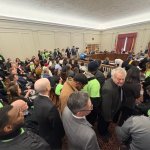CAPE MAY – Just as the City of Cape May announced a settlement of its lawsuit with the Cape May County Prosecutor’s Office, city officials, including Clerk Louise Cummiskey, face new legal action filed by Harry Scheeler, a resident of North Carolina who formerly lived in Cape May County, over Open Public Records.
Scheeler maintains a website in which he states he is an “open government activist” helping those unjustly denied access to government records and documents. See related story.
On Sept. 8, Scheeler notified Cummiskey of the lawsuit while simultaneously sending copies of the cover letter, brief and supporting documentation to local media. The suit stems from what Scheeler claims is unsatisfactory response from the city to records requests dating at least to July. See requests.
As of Sept. 16, City Solicitor Anthony Monzo said that the city had not yet been served with the suit and he had no knowledge if it had yet been filed with the court.
Scheeler states in his civil action that he was approached by city residents for help in obtaining documents under OPRA. (Open Public Records Act), which states that all records are accessible unless they meet a permitted exception or exemption.
Represented by C.J. Griffin of Pashman Stein in Hackensack, Scheeler says he is assisting local residents who suspect “unethical and inappropriate conduct in their local government.”
Monzo sees it differently. He sees Scheeler as someone “making outrageous demands” and seeking to “provoke a denial” which he can then pursue through legal action.
He talks of Scheeler’s actions as “harassing the city clerk with threats of personal liability” and his “disruption of municipal operations” by requesting records “that he knows are confidential and exempt.”
Monzo says Scheeler is seeking a “plethora of documents that he has no interest in and for which he has no legal standing to request under OPRA.” Monzo adds, “Nonetheless, the city has still continued in its attempts to satisfy his demands.”
Initial information sought through a series of OPRA requests includes documents related to legal fees for the city solicitor, labor counsel, special counsels handling litigation regarding the recent suit of the Cape May County Prosecutor’s Office and the ongoing suit related to the construction of Convention Hall.
Scheeler is also seeking records for legal services relating to the recent controversies surrounding the police department, including the contract and billing records for James Fallon, a retired state trooper who was hired to conduct an internal affairs investigation by the city.
Also requested are billing records from the legal firm that represented the city in its efforts to alter the school funding formula.
Subsequent requests for documents have included records related to an engagement of Remington, Vernick, and Walberg Engineers for engineering services, automated records detailing the use of the copier machine in the clerk’s office, and copies of the subpoenas issued by the prosecutor’s office which the prosecutor has withdrawn as a part of the recent settlement.
On July 24, Scheeler also requested “all purchase orders and or invoices for document shredders” purchased by the city in the last five years.
Scheeler’s stated purpose is providing support for citizens who feel they may have been misled by city officials.
The OPRA process described in the complaint began with the requests for legal bills. A group of residents who regularly attend city council meetings had already requested that City Manager Bruce MacLeod report on amounts spent for legal services.
MacLeod did so in an open meeting, a video of which is posted for public access. The OPRA request would represent a possible check on whether MacLeod had misled the public.
A response was provided to Scheeler. Monzo says the bills were sent with appropriate redactions.
Scheeler’s complaint states that the bills were heavily redacted, in violation of OPRA rules, and the redactions were not properly supported as to accepted reasons for exemption. The city takes the position that the bills, as provided, show the amount billed and the nature of the work done.
Monzo said that the redactions were to protect attorney-client privilege which, once surrendered, cannot be easily reclaimed.
According to Monzo, the redactions prevent the reader from seeing specific items being worked on by attorneys, but that unredacted portions make clear the area of work the law firm is engaged in for the city.
A reader could see, for example, that the work being done was related to the Convention Hall construction suit and the amount billed.
A reader would not see the specific item on which the attorney was working. Monzo notes that this is still an open suit and any material released to Scheeler would be available to the attorneys opposing the city.
Just weeks after these first exchanges, the city says things took an aggressive turn. Additional requests were made and what Monzo believes is the ongoing personal harassment of Cummiskey intensified.
Scheeler sent Cummiskey emails threatening her with personal liability and suit, according to the city. Scheeler also added to his OPRA requests demands for her resume “as submitted for employment,” and her financial disclosure forms, along with those of select city officials.
Scheeler additionally requested a copy of the city employment directory and followed receipt of that item from the city with an email to around 50 employees asking them to contact him about violations of the Faulkner Act, specifically focusing on the actions of Mayor Edward Mahaney.
The context of the email makes clear Scheeler’s interest in any instance where Mahaney intruded into the executive management of the city.
As early as July 17, in an email to Mahaney, Scheeler had already threatened “extensive litigation” just two weeks after the first OPRA request he cited in his complaint as not being fully satisfied.
In none of the correspondence has Scheeler ever stated who or even how many residents approached him, nor is it fully clear in what capacity he is assisting them.
He states in a web posting “I do not represent anyone in my filings.”
City officials are concerned that he is seeking reasons to sue and is attempting to force denials of his many requests.
Scheeler’s website, opracrusades.com, recently published a post that stated that “Cape May City has plans to hire three new firefighters,” and he notes community support for the plan.
He then sstated that the city is “lukewarm to the idea.” Officials point out that the recommendation to hire the added personnel came from a task force with two members of council on it and the city manager. The full council then approved the recommendation unanimously.
Scheeler’s post goes on to state that “sources,” which he never names, tell him “that the city plans to use OPRA expenses as the catalyst to tell the fire department they cannot now afford the new hires.”
Scheeler often references his extensive career in journalism, but Monzo points out he has no problem with making such statements on the basis of unnamed sources.
Mahaney says that the city intends to move ahead with the hires and that no discussions of the type Scheeler implies have occurred.
In the same web posting, Scheeler described his suit, decried the city’s intent to fight an “unwinnable” legal action and predicts the costs for the city of a ruling and lost appeal will exceed $100,000, “which would not be covered by insurance.”
Scheeler titled the post “Cape May City uses OPRA litigation as an excuse to block new fire department hires,” even though no such action has been taken, according to the city.
In another post to his website, Scheeler said the city’s response to his Government Records Council (GRC) complaint “is very typical of a town riddled with corruption.”
To Monzo and Mahaney, these types of online posts are inflammatory and have no reasonable relationship to the stated goals of Scheeler’s OPRA effort.
Monzo notes that “The City of Cape May has a long history of compliance with all OPRA requests in a prompt, complete, and courteous manner. The city has always been able to provide all requested documents, provide adequate response for denials of exempt documents or resolve any attempts to pursue remedies through the GRC.”
Monzo calls the lawsuit “frivolous” and is asking that it be withdrawn. He said, “If not, we will seek sanctions and a recovery of all legal fees and costs incurred by the city.”
To contact Vince Conti, email vconti@cmcherald.com.
Avalon – The 3 major mainstream media TV channels have to feel why the people have lost interest in their coverage especially on what has happened at the border on illegal immigration crossings. In a short…








